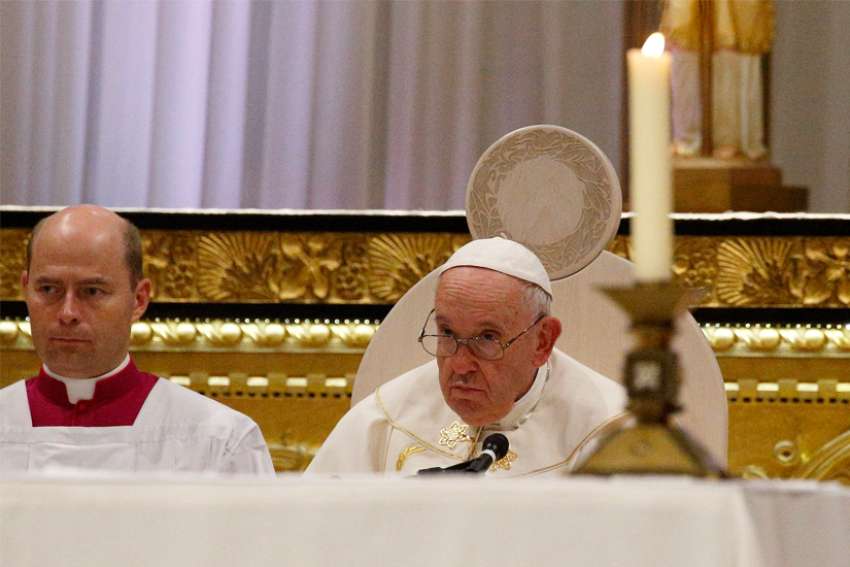STE.-ANNE-DE-BEAUPRÉ, Que. -- In the face of sin and failure, the temptation to wallow in despair and do nothing comes from the devil, Pope Francis said.
While commentators, politicians and survivors discussed whether Pope Francis' apology for the Catholic Church's role in running residential schools was enough, the Pope insisted reconciliation requires faith, action and the courage to move forward.
"The enemy," or the devil, "wants to paralyze us with grief and remorse, to convince us that nothing else can be done, that it is hopeless to try to find a way to start over," the Pope said July 28 during Mass at the National Shrine of Sainte-Anne-de-Beaupré.
The Pope, continuing to experience knee pain, preached and led the Liturgy of the Word, but Cardinal Gérald Lacroix presided over the Liturgy of the Eucharist.
Some 1,400 people — including many survivors of residential schools — were inside the shrine, while thousands of others sat in camp chairs or on blankets on the lawn outside.
At the "Mass of Reconciliation" at the shrine, the Gospel reading was the story of the disciples on the road to Emmaus, dejected and confused after the crucifixion of Jesus.
"That experience also marks our own lives, and our spiritual journey, at those times when we are forced to recalibrate expectations and to cope with our failings and the ambiguities and confusions of life," the Pope said.
It also is natural, he said, to "feel crushed by our sins and by feelings of remorse."
"What happened? Why did it happen? How could it happen?" are all legitimate questions, the Pope said, and "they are the burning questions that this pilgrim Church in Canada is asking with heartfelt sorrow on its difficult and demanding journey of healing and reconciliation" with the nation's First Nation, Inuit and Métis communities.
"In confronting the scandal of evil and the body of Christ wounded in the flesh of our Indigenous brothers and sisters," he said, "we, too, have experienced deep dismay; we, too, feel the burden of failure," like the disciples when they fled Jerusalem and headed to Emmaus.
The "temptation to flee" is real and to stop thinking about the failure is real, the Pope said.
But, he said, the Gospel teaches that "it is in precisely such situations of disappointment and grief — when we are appalled by the violence of evil and shame for our sins, when the living waters of our lives are dried up by sin and failure, when we are stripped of everything and seem to have nothing left — that the Lord comes to meet us and walks at our side."
Pope Francis encouraged Canadian Catholics to recognize Jesus in the breaking of the bread as the disciples did in the Gospel story and allow Him "to show us the way to healing and reconciliation."
"In faith," he said, "let us break together the eucharistic bread, so that around the table we can see ourselves once again as beloved children of the Father, called to be brothers and sisters all."
At the beginning of the Mass, protesters held up a banner inside the shrine calling on the Pope to "rescind the doctrine," an apparent reference to the so-called Doctrine of Discovery, a collection of old papal teachings, beginning in the 14th century, that encouraged explorers to colonize and claim the lands of any people who were not Christian, placing both the land and the people under the sovereignty of European Christian rulers.


